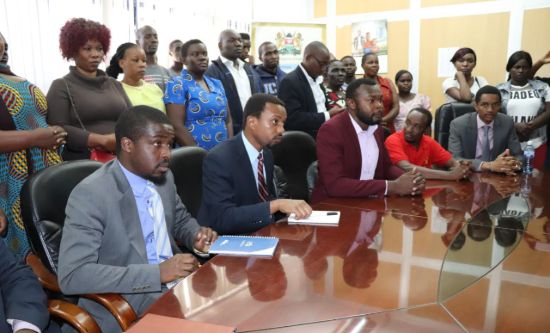
On 7 April 2021 the Communist Party of Kenya (CPK) held a demonstration against the Kenyan government’s disastrous approach to the Covid pandemic and the acceptance of a $2.4bn IMF loan. The police unlawfully and undemocratically shut down the protest, then went on to raid the CPK headquarters, making a total of 18 arrests, CANDICE STARLING reports.
Kenya has a long history of struggle against oppression dating back to the days of the British colonial occupation. This oppression is particularly prevalent amongst communist organisers. Kenya was colonised by Britain in 1920. During the 1950s the anti-colonial Kenya Land and Freedom Army, or Mau Mau, fought back against British rule, often having to organise in concentration camps. In these camps acts of torture, including castration and sexual assault, were commonplace, yet the Mau Mau continued to resist until finally gaining liberation in 1963. However, Kenya’s first independence president was Jomo Kenyatta, who collaborated with the British empire and installed a neo-colonial capitalist regime in the newly-liberated country. He did not have an anti-imperialist or socialist streak, unlike the rest of the Kenyan independence fighters. Kenyatta’s true legacy is starting to be realised by the Kenyan masses, who in 2020 toppled his statue and replaced it with one of Dedan Kimathi, a Mau Mau leader.
Kenyatta was succeeded after his death by the dictator Daniel Moi, whose reign was plagued with human rights abuses and corruption – often in the interests of British imperialism. Moi’s successor, Mwai Kibaki, oversaw the 2010 constitution change which signalled a turn towards liberalism. Although a move in the interests of capital, the new constitution created more democratic freedoms, including the right to associate. This allowed the CPK – then known as the Social Democratic Party of Kenya to disguise its revolutionary tendency – to begin to organise openly.
In 2013 Uhuru Kenyatta, son of Jomo Kenyatta, was elected president. He originally ran on a progressive platform, promising land for a Palestinian embassy and talking about creating ties with socialist Cuba. However, much like his father, Kenyatta has continued the rule of neo-colonialism and imperialist collaboration, including with the British former Labour Prime Minister Tony Blair, who was brought in to advise Kenyatta in 2015.
Under Kenyatta the CPK has been able to organise more openly than in the past. This in no way absolves Kenyatta of his neoliberal puppetry. Kenyatta’s rule has been characterised by disdain for the poor and support for Kenya’s monied elite, exacerbated by the Covid pandemic. Around 1.4 million workers in the tourism industry were hung out to dry as tourism in the country collapsed, and 75,000 agricultural workers have been laid off as exports have halved in the last year – both due to Covid-19. The government has done nothing to ensure these workers have any financial security. Instead, Kenyatta’s government has accepted a 256bn KSh ($2.4bn) loan from the IMF. Not only have the details of the loan not been publicly announced, but the move also comes at a time when Kenya is already drowning in debt. Currently the national debt stands at $70bn, a figure which has quadrupled since 2013.
The government’s acceptance of the IMF loan led to large protests in April and an online petition reaching 150,000 signatures in 24 hours. It is clear the Kenyan people are sick of being in debt to imperialist institutions and understand that IMF loans always come at the expense of the working class, while allowing western imperialists and their bourgeois pawns to tighten their grip on underdeveloped nations.
In 2005 as much as 69% of Kenya’s total wealth was owned by foreign business owners and investors; 74.3% of the tourism industry and 78% of tea profits were foreign-owned. In 2012 the housing deficit stood at two million with around 60% of the population living in informal settlements, and in 2016 around 36.1% lived below the poverty line. The CPK has been outspoken about the government’s corruption. Large sums of money put aside for funding projects often go to companies owned by Kenyatta, his family or his friends. These are the conditions the CPK organises under.
The protests against the government’s Covid response took place in Nairobi for two weeks before the police attacked and tear-gassed the protesters and arrested six Communist Party members during a media conference. An hour later, as the CPK was regrouping at its headquarters, the building was raided by police, and 12 more arrests were made. As officers were attempting to further ransack the CPK office, including attempting to access sensitive documents, they were halted by lawyers with the threat of legal action. The first six arrests made at the protest were charged under the Health Act for not social distancing and charged 3,000 KSh each.
The trial for the other 12 arrestees was postponed twice and deadlocked by bureaucracy which the CPK says is yet more proof of the government’s corruption and of its desire to intimidate resistance. The 12 Party members were eventually charged with ‘failure to social distance’. All comrades pleaded not guilty and the hearing was set for 7 July, a day of national resistance known as the Saba Saba day. This is the day in 1990 when Kenyans gathered en masse to demand free elections from the rule of Daniel Moi, though it has taken a new meaning in recent times as a day used to highlight police brutality and killings. We stand in solidarity with our Kenyan comrades who are under attack. We support their right to protest and are following their trial against the neoliberal Kenyan prosecutors and their greater struggle against imperialism and the corrupt capitalist class of Kenya.




